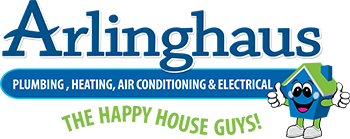There are some home maintenance tasks we tackle without a second thought, and others we tend to put off, figuring we’ll get to them eventually. Changing your furnace filter often falls into that “I’ll get around to it” category. But delaying this small, easy step can lead to bigger problems for your home’s heating and cooling system, indoor air quality, and even your budget. It’s important to know how often you should change your furnace filter so that you can keep your heating system running smoothly, avoid increased energy consumption, and help your family breathe easier.
This blog covers everything you need to know about furnace filters: why they matter, signs your furnace filter needs changing, and how often you should change it based on several factors.
Why Furnace Filters Matter
A furnace filter does more than you might think. Its primary function is to trap dust, pet hair, dander, pollen, and other airborne particles, keeping them from circulating through your home and, more importantly, out of your heating and cooling system. Not only does a clean filter improve indoor air quality, but it also helps keep your HVAC system working efficiently by reducing strain on the blower motor, heat exchanger, and other components. If the filter gets clogged, it restricts airflow, reduces the system’s efficiency, and can even lead to costly repairs.
Impact on Indoor Air Quality
The quality of the air you breathe indoors directly affects your health and comfort. A clogged filter can reduce indoor air quality by allowing dust, allergens, and other particles to recirculate. If anyone in your home has asthma, allergies, or other respiratory issues, the importance of changing your furnace filter on time is even higher. Not only does it contribute to a healthier environment, but it also supports the longevity and efficiency of your heating and cooling system, helping to keep your utility bills lower.
How Often Should I Change My Furnace Filter?
So, how often should you change your furnace filter? The answer to this question isn’t the same for everyone. While most manufacturers recommend a filter change every one to three months, several factors can affect this timeline.
Factors Affecting How Often You Should Change Your Furnace Filter
Here’s a look at the common factors that influence how often you should change your furnace filter:
- Filter Type: There are different types of filters with varying lifespans. Pleated filters, for instance, tend to last longer than fiberglass filters. HEPA filters are effective but can require more frequent replacement.
- Home Environment: Homes with pets or smokers usually need more frequent filter changes to handle the extra pet dander and smoke particles in the air.
- Usage Level: In the winter months, when the furnace is working more, filters will need to be changed more often. During milder seasons, when you’re not using the heating or cooling system as much, you might be able to go a bit longer.
- Air Quality Needs: Homes in areas with high outdoor air pollution or airborne contaminants may also require more frequent filter replacements to keep indoor air quality optimal.
General Guidelines for How Often You Should Change Your Furnace Filter
While there isn’t a one-size-fits-all answer, here are some general guidelines to help:
- One-inch filters: Change every one to three months.
- Pleated air filters: Last around three to six months, depending on MERV rating and air quality.
- HEPA filters: Typically replaced every 12 months, though some systems may require more frequent changes.
When it comes down to it, the best way to know how often to change your furnace filter is to inspect it regularly and follow the manufacturer’s recommendations for your specific system.
Signs Your Furnace Filter Needs Changing
While it’s helpful to follow a schedule, there are often clear signs your furnace filter needs changing. Here’s what to watch out for:
Visible Dust and Debris on the Filter
A quick glance at your furnace filter can usually tell you if it’s overdue for a replacement. If you see it’s covered in dust, pet hair, or debris, it’s likely time for a change.
Reduced Airflow in the Home
If you notice that certain rooms aren’t getting as much airflow or that your home feels stuffier than usual, it might be a clogged filter restricting airflow. Reduced airflow strains the HVAC system and can lead to higher energy bills.
Increased Dust on Surfaces
When the dirty filter is too clogged to trap dust effectively, you may notice more dust settling on your furniture and floors. This is a sign that your filter isn’t doing its job.
Strange Odors
If you’re starting to notice musty or stale odors when the heating or cooling system kicks on, this can be one of the telltale signs your furnace filter needs changing. These smells could mean that dirt, debris, and other airborne contaminants are trapped in your filter, and it’s time to change it.
Higher Energy Bills
A clogged filter forces your furnace to work harder, which uses more energy. If your utility bills are creeping up, it’s worth checking the filter. This small change could lead to a noticeable drop in energy consumption, so don’t put off a filter replacement.
Choosing the Right Furnace Filter for Your Home
Not all furnace filters are the same. Knowing which one is best for your system can maximize both efficiency and air quality. Here are a few common options:
- Fiberglass Filters: Affordable but need to be replaced frequently (every one to two months). They trap larger particles but aren’t ideal for homes with air quality concerns.
- Pleated Filters: Made from a dense material that captures smaller particles, pleated filters are more effective and last longer than fiberglass filters.
- HEPA Filters: These high-efficiency filters capture up to 99.97% of airborne contaminants. While effective, they’re not compatible with all HVAC systems, so check with a professional if you’re interested in HEPA filters.
MERV Ratings
The Minimum Efficiency Reporting Value (MERV) rating indicates how effectively a filter traps particles. A higher MERV rating means the filter captures more particles, but it may also restrict air flow more, putting extra strain on your system. For most households, a MERV rating between 8 and 13 offers a good balance of filtration and airflow.
Benefits of Regularly Changing Your Furnace Filter
Beyond improving indoor air quality, there are several key benefits to regularly changing your furnace filter:
- Increased Energy Efficiency: A clean filter helps your furnace operate more efficiently, lowering your heating and cooling costs.
- Longer HVAC System Life: Reducing strain on the blower motor, heat exchanger, and other components can extend the life of your heating and cooling system.
- Better Indoor Air Quality: Replacing your air filters on a routine basis improves indoor air quality. Clean filters capture more dust, pollen, and other airborne contaminants, which is particularly beneficial for allergy sufferers or households with pets.
Schedule Your Furnace Services With Arlinghaus!
Regularly changing your furnace filter is one of the easiest ways to keep your home comfortable, energy-efficient, and healthy. But we know life can get busy, and remembering all the little maintenance tasks can be challenging. That’s where Arlinghaus comes in! Our team of experienced HVAC professionals can help you with furnace maintenance, including air filter replacements, checkups, and more. If you’re in need of a new furnace, we also offer furnace installation in Cincinnati, OH, and beyond.
Schedule your next service with Arlinghaus today in Cincinnati, OH, Erlanger, KY, or one of the nearby areas, and enjoy the peace of mind that your system is in top shape!


